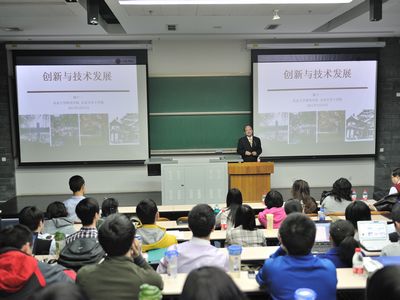Peking University, Apr. 10, 2011: Professor Chen Shiyi, dean of the Graduate School (GRS) and dean of the College of Engineering at Peking University (PKU) gave a lecture on innovation and technological development at the Caizhai Lectures on the evening of March 31. The main opinion of the lecture is “the innovation needs different point of views.”

Professor Chen said in his lecture that the studying and working experience at America taught him the power of innovation: achieving the world peace, changing the ways people think, and even saving the lives. In the brief history of the world modern technology, he considered the “Z3 (the world's first working programmable, fully automatic computing machine designed by Konrad Zuse)”, the “Transistor (a semiconductor device used to amplify and switch electronic signals )”, the “WWW(World Wide Web, a system of interlinked hypertext documents accessed via the Internet)”, and the “Iphone(a line of Internet and multimedia-enabled smartphones designed and marketed by Apple Inc.)” as the most significant inventions ever since.
Then, Professor Chen talked about the well-known Needham problem: why there were few inventions in China compared with the Europe in the modern times. He sighed that this was also the major problem in China at present. “But don’t worry, we are on the way,” he said with confident. With proud smile on his face, Professor Chen took two examples: one was the Tianhe-I, which was ranked as the world's fastest supercomputer in the Top 500 list released at the 2010 Supercomputing Conference and was 1.4 times faster than the US’s Jaguar which ranked after; the other was the Shanghai Maglev Train, which was the first commercial high-speed maglev line, with a top speed just second to a plane’s.
Though China has achieved a lot of innovations, Professor Chen pointed out that there was still a gap remaining between China and other countries. Just like what Bo Xilai, then minister of China's Ministry of Commerce, once said: “We could obtain only one Boeing jetliner by selling 1.2 billion T-shirts.” Professor Chen also introduced the successful cases of Boeing, Apple, Google, IBM, and Intel to illustrate the core strength of the market-driving force and the engineers, as well as the importance of directing the products development by consumption. He took the Huawei as an example, which was among the Fortune 500, spending 10% of its total profit on innovation while IBM spent 6%.
How to promote the innovation? Professor Chen offered his suggestions. For one thing, it was well to form and accomplish the chain of the universities, the research institutes, and the companies, and lead the universities back to the basic research. For another, it was important to propel the risk investment and promote the practical abilities of talents. Furthermore, we should learn from the American experience on the graduates’ education, including the diversified enrollment, the interdisciplinary curriculum, the enhancement of fundamental theories studying and scientific research capability, and the internationalization of education.
At last, Professor Chen said: “The innovating environment, research fund, and management systems are not so far different from the foreign countries in China. There is still room for improvement on the research directions and judging systems.”
The lecture was hosted by Professor Wang Yanglin, executive vice president of the GRS, and was the fourteenth lecture of the Caizhai Lectures, which is sponsored by the GRS.
Written by: Li Nuoya
Edited by: Su Juan
Source: PKU News (Chinese)